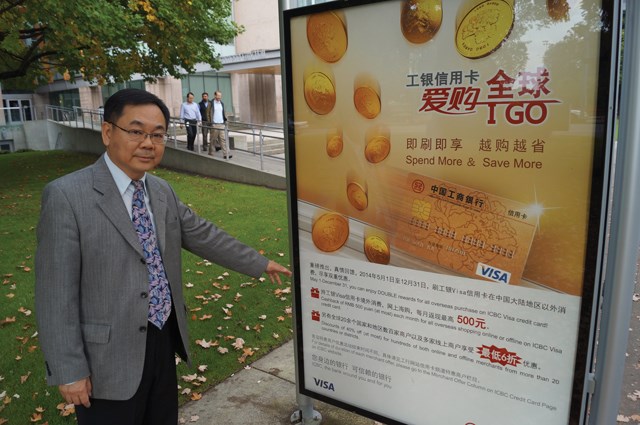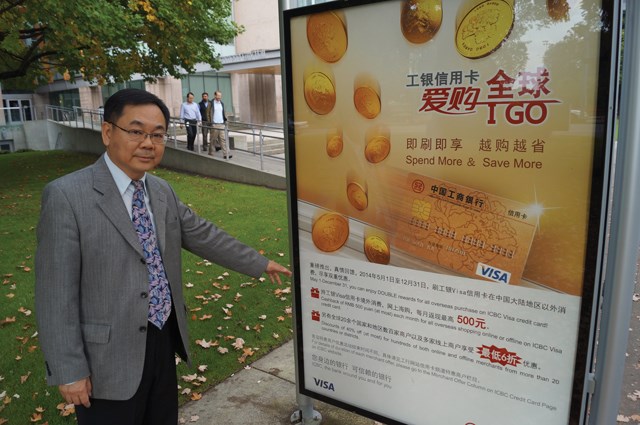
When is it too much and where is the line that shall not be crossed when it comes to the proliferation of Chinese language on signage in Richmond?
For outgoing city councillor Evelina Halsey-Brandt, the tipping point was the erection last month of a residential development billboard in her City Centre neighbourhood that read entirely in Chinese.
Despite dismissing a bid by a delegation of residents 18 months ago to force the city into creating a bylaw demanding English on every sign, Halsey-Brandt said her u-turn was sparked by a situation that has gotten much worse in the last year and a half.
She even challenged whomever gets re-elected or elected on Nov. 15 to bring forth a bylaw requiring at least 50 per cent English on public signs.
“The time has come to say that you’re part of Richmond and part of Canada,” said Halsey-Brandt, who announced a few weeks ago that she won’t be running for re-election after 19 years at city hall.
“I’ve had enough of it and that sign in my neighbourhood was the last straw.
“It’s one thing for businesses to advertise only in Chinese, but on development signs that are supposed to inform me of what’s going on in my neighbourhood?”
Independent city council candidate and youth worker Henry Yao — who was born in Taiwan and who speaks and reads Mandarin — thinks all public signs should have a good portion of English on them.
“I’d like a bylaw to be at least looked into,” said Yao.
“What that bylaw would be asking for, I’m not too sure, but there has to be more English on the signs.”
Yao, although a “huge fan” of multiculturalism and inclusiveness, said that in order for a culture to be fully appreciated, it must be understood and communicate properly.
“When (cultures) are separated through signage, it becomes an exclusive environment,” said Yao.
“We should do our best to foster communication and appreciation and celebrate our identity that includes others.”
Yao said signs with predominant Chinese create barriers, open the window to racism and even create issues for younger generation Chinese.
“I know many Chinese youth and young adults who don’t speak or read Cantonese or Mandarin and they don’t feel comfortable going into certain places because of the signage,” added Yao.
Coun. Ken Johnston said he’s certain the signage will become an election issue, but added that he’s not received one email or phone call about the subject.
“Given the amount of change this city has gone through, I think we have tremendous harmony and when those people came forward (18 months ago), I really didn’t think this was an issue,” said Johnston, who didn’t support a delegation’s call for a bylaw in 2013.
“Now? I honestly don’t know if there’s more or less. A bylaw is hard to enforce and I’d still go with education and discussion.”
Former Olympic snowboarder and independent city council candidate Alexa Loo said she knows people from North Vancouver who drive down No. 3 Road and lose their sense of where they are, due to the signage.
“Is that the community we want to live in?” said Loo.
“It’s not healthy for people to feel isolated in their own community. English has to be clear on those signs and we’re actually getting signs with no English at all.”
Loo said it might very well get to the point where a bylaw is required.
“It doesn’t need to be predominant with English, but it needs to be clear.”

Coun. Chak Au — the only member of council who wanted the city to investigate the issue back in 2013 — still isn’t sure if a bylaw is the answer, but acknowledged that something has to happen.
“We need to find solutions that are fair and enforceable; we need to have guidelines and a certain standard,” said Au, who spends a lot of his time engineering communication and links between different cultural groups in Richmond.
“But I don’t think a bylaw will totally solve the problem. The signage issue is on the surface; it’s a symptom of a very complex issue that won’t be resolved overnight.”
Halsey-Brandt, meanwhile, railed against accusations she’s only coming out against the signage now that she’s got no Chinese community votes to lose.
“I’m not sure I even had those votes in the first place,” laughed Halsey-Brandt.
“But people who know me, know that my integrity was never for sale and if I made a mistake, I put my hand up and admitted it,” she added.



